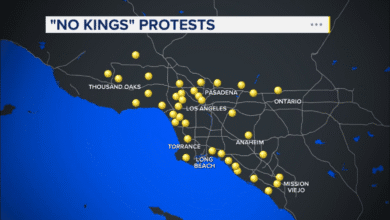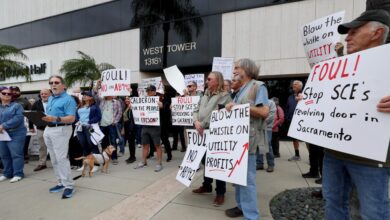Democrats could keep a foothold in the South via these 3 races for governor : NPR


Voters in 3 states — Louisiana, Kentucky and Mississippi — will head to the polls this year to elect or reelect their governors.
Each state leans Republican when voting for national politicians, and each has a GOP supermajority in the state legislature.
But despite the saturated red color of the rest of the political scene in these Southern states, this year’s gubernatorial elections are not foregone conclusions.
Kentucky
In Kentucky, Republicans have been winning statewide offices by wide margins in recent years, with GOP control over five of the state’s six congressional districts.
But in the 2019 gubernatorial election, Democrats recaptured the state’s top seat with Andy Beshear, who barely squeaked by with about 5,000 votes against embattled Republican incumbent Matt Bevin. Republicans still hold a supermajority in both of the state’s legislative chambers, and all other state constitutional offices are held by Republicans, placing Beshear under constant scrutiny from his political rivals.
Even against such a stark partisan divide, Beshear has carved out a place in Kentucky politics to become one of the most popular governors in the country, according to recent Morning Consult polls. He has been commended for his handling of recent disasters in the state, including a massive tornado outbreak in 2021 and historic flooding in 2022.
Running against him in November is the state’s Republican Attorney General Daniel Cameron, who easily won his party’s nomination in a crowded primary. Cameron, often regarded as a protégé of U.S. Sen. Mitch McConnell, was thrust into the national spotlight for his handling of the indictment of the police officers involved in the Breonna Taylor killing, which sparked racial justice protests in the state and across the country. Cameron ultimately chose to not recommend charging officers for killing Taylor. Cameron is the first Black man to win a major party nomination for the governorship of Kentucky.
Hot-button social issues have dominated the race as Beshear and Cameron go back and forth on their visions for the state. Cameron is staunchly anti-abortion and supports restrictions on gender-affirming care for transgender youth, while Beshear has focused on uniting the state across political lines and encouraging economic development.
Sylvia Goodman is a breaking news reporter for Louisville Public Media.
Louisiana
Louisiana is another state where a Democrat has held onto the governor’s mansion, despite having a deeply red legislature. For the last eight years, John Bel Edwards has held the governor’s office, but this year he is out of the running due to Louisiana’s term limit, which is capped at two consecutive terms.
His departure creates an opportunity for Republicans to take total control over the state’s top office — and with it, an opportunity to change or scrap policies passed by the Edwards administration over his last two terms.
Republican Jeff Landry is the race’s presumed frontrunner. Landry is the Louisiana attorney general and is known for his tough-on-crime rhetoric, and has been endorsed by the state’s Republican Party and former President Donald Trump.
Shawn Wilson, the only high-profile Democrat in the race, is polling second to Landry. He is the former secretary of the Louisiana Department of Transportation, and has pulled on that experience on the campaign trail with a pledge to “build bridges, not burn them.” To win, Wilson, who is Black, will need to garner above 90% of all Black votes in the state and one-third of the white votes. That’s a tough goal to reach in a persistently Republican state, and his reputation as more progressive than the incumbent Democratic governor will only steepen Wilson’s uphill battle to the governor’s mansion.
Louisiana has an open primary, which means that the top two candidates, regardless of party, are chosen for the general election, or a candidate can win outright by garnering more than 50% of the vote in the primary. Of the 16 candidates that qualified for the Oct. 14 primary, half are running as Republicans.
Molly Ryan is a political reporter for Baton Rouge Public Radio.
Mississippi
Republicans hold all statewide offices in Mississippi and supermajorities in both chambers of the legislature, so a Democrat capturing the governor’s mansion would be a major boon for a state party that is seen as uncompetitive and dysfunctional.
Incumbent Republican Gov. Tate Reeves easily defeated two GOP primary challengers in the primary, setting up what is likely to be an ugly and expensive general election campaign against Democratic challenger Brandon Presley, who is a cousin of Elvis Presley and a commissioner for Mississippi’s utility regulator.
Presley is trying to link Reeves with a culture of corruption in Mississippi politics, like the state’s sprawling welfare scandal, which saw millions of dollars of Temporary Assistance for Needy Families funds misused to benefit the rich and powerful.
The biggest issues on the campaign trail have been tax cuts and health care, with both candidates offering wildly different views; Reeves wants to eliminate the state income tax, while Presley wants to cut car tag fees in half and eliminate the state’s highest-in-the-nation grocery tax.
Presley has pledged to expand Medicaid to the working poor under the Affordable Care Act — something he argues would drastically reduce uncompensated care costs for struggling hospitals. Mississippi is one of only 10 states that has not expanded Medicaid, and nearly half of the state’s rural hospitals are at risk of closing.
Reeves has derisively called Medicaid expansion “welfare” and says that getting more people insured through their employers is a better way to address health care access needs.
Will Stribling is a reporter for Mississippi Public Broadcasting.
A previous version of this story incorrectly stated that the Louisiana governor terms out after two consecutive years. It is two consecutive terms.





